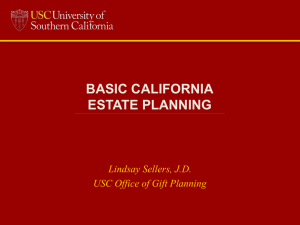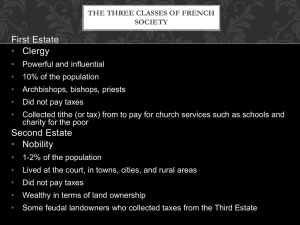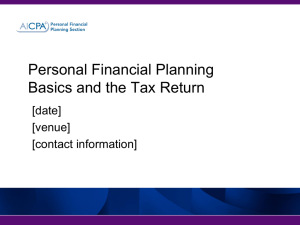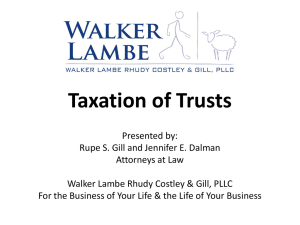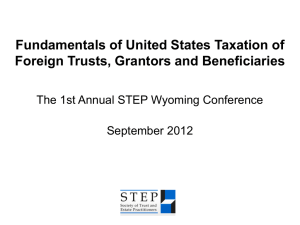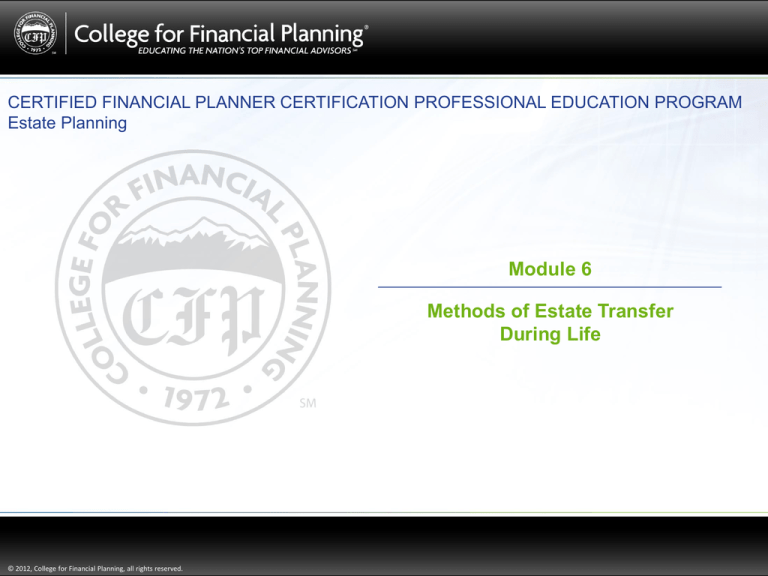
CERTIFIED FINANCIAL PLANNER CERTIFICATION PROFESSIONAL EDUCATION PROGRAM
Estate Planning
Module 6
Methods of Estate Transfer
During Life
© 2012, College for Financial Planning, all rights reserved.
Learning Objectives
6–1
Identify the purpose (uses), characteristics, and factors to be considered in
using a given inter vivos intrafamily planning technique.
6–2
Analyze a situation to determine the tax implications and/or the advantages
and disadvantages of a given inter vivos intrafamily planning technique.
6–3
Evaluate a situation to select the most appropriate property and/or technique
to accomplish a client’s inter vivos intrafamily planning objectives.
6–4 Identify the purpose (uses), characteristics, and factors to be considered in
using a given inter vivos closely held business transfer technique.
6–5
Analyze a situation to determine the tax implications and/or the
advantages/disadvantages of a given inter vivos closely held business
transfer technique.
6–6 Evaluate a situation to select the most appropriate transfer technique to
accomplish a client’s inter vivos closely held business planning objectives.
6–7 Identify the purpose (uses), characteristics, objectives, and factors to be
considered in using a given inter vivos life insurance planning technique.
6–8
Analyze a situation to identify the tax implications and/or the advantages and
disadvantages of a given inter vivos insurance planning technique.
6–9
Evaluate a situation to select the most appropriate technique to accomplish a
client’s inter vivos insurance planning objectives.
1-2
Questions to Get Us Warmed Up
6-3
Inter Vivos Gifts: Questions
What is the purpose
or goal of the gift?
Who will be
the donee?
Should the donor retain
an interest in or control
over the gifted assets?
What assets
will be transferred?
What form will the transfer
take? Outright gift …
custodial account …trust?
6-4
Inter Vivos Gifts: Identity of Donee
Factors if identity of donee is not dictated
by desire to help a specific individual or
charity:
• the competency of the potential donee
• the estate tax status of the potential donee
• the potential donee’s marginal income tax
bracket
• the potential donee’s relationship to the donor
Don’t forget that direct and exclusive payment of
medical and tuition expenses is free of both gift
tax and GSTT.
6-5
Inter Vivos Gifts: Retained Interest or Control
Possible Consequences:
• Income tax — may not shift taxation
•
•
(e.g., because of grantor trust rules)
Gift tax—may cause Chapter 14 rules to apply
Estate tax:
o may cause transfer sections
(Code sections 2036–2038)
to apply
o may cause three-year rule to
apply if retained interest is
released within three years
of death
o may jeopardize marital or
charitable deduction
6-6
Inter Vivos Gifts: Gift Leaseback
• fee simple gift of business property
• business owned or controlled by donor leases property
•
•
•
•
from donee
business gets income tax deduction for lease payments
(if reasonable and necessary)
donor owes gift tax (and possibly GSTT) on FMV of
gifted property
gifted property is removed from donor’s gross estate
donee assumes donor’s basis in
gifted property, must report lease
payments as ordinary income,
and must include property in
gross estate if owned at death
6-7
Inter Vivos Gifts: Reverse Gift
• appreciated property is given to a donee expected to
•
•
•
•
predecease the donor, and is given with expectation
that donee will give property back to donor by will
purpose: donor wants a stepped-up income tax basis
gift is subject to gift tax and possibly GSTT
donee must have no legal obligation to bequeath
property to donor and must include property in gross
estate if owned at death
donor achieves step-up in basis
only if more than one year
elapses between completion
of the gift and donee’s date
of death
6-8
Inter Vivos Gifts: Net Gift
• gift is conditioned on donee assuming a legal obligation
•
•
•
•
of the donor—e.g., a mortgage on gifted property or
obligation to pay gift tax on the transfer
gift tax is paid only on net amount of the gift and donor’s
credit status is used
donor is liable for GSTT if donee is skip party in relation
to donor
if obligation assumed by donee exceeds donor’s
adjusted basis in the property, donor realizes gain to
extent of excess
donor’s estate includes taxable gift and resulting credit
(if gift tax is actually paid) in estate tax calculation,
regardless of tax being paid by donee
6-9
Inter Vivos Gifts: Custodial Accounts
Characteristics
•
•
•
•
Property is titled in the name of
some competent adult as the
custodian for a minor pursuant to
state’s adoption of either UGMA or
UTMA.
Separate account must be
established for each minor.
Age of majority (when minor must be
given control of property) is set by
state law.
Not a true trust, since minor has both
legal and equitable title to assets;
however, use of assets for benefit of
minor prior to majority is at
custodian’s discretion.
6-10
Inter Vivos Gifts: Custodial Accounts
Taxation
•
•
•
•
Income from custodial assets is taxed
to minor except for income used to
discharge a legal obligation of support
of the minor’s parent that is taxed to
the parent; kiddie tax rules apply;
grantor trust rules do not apply.
Custodial account is a completed gift
and is eligible for annual exclusion
even though no present interest.
Donor is subject to GSTT if minor is a
skip party in relation to the donor.
If donor dies while custodian, property
contributed by donor is included in
donor’s gross estate.
6-11
Inter Vivos Gifts: Section 2503(c) Minor’s Trust
Characteristics
• Property is given to an irrevocable trust in which a minor
•
•
•
under the age of 21 years is both the sole income and
remainder beneficiary.
Trust property may be used for the exclusive benefit of
the minor beneficiary at the trustee’s discretion.
Upon reaching age 21, minor beneficiary
must be allowed to remove the property
from the trust.
If minor dies prior to age 21, trust
property must be paid to minor’s
estate or to appointee of the minor.
6-12
Inter Vivos Gifts: Section 2503(c) Minor’s Trust
Taxation
•
•
•
•
•
Income is taxed to the minor except income used to
discharge a parental obligation of support that is taxed to the
parent.
o kiddie tax rules apply
Donor must pay gift tax on FMV of assets given less one
annual exclusion.
Donor must pay GSTT if minor is skip party
in relation to donor.
If donor dies while trustee or successor
trustee, property given by donor will be
included in donor’s gross estate.
Assets will be included in donee’s
gross estate if owned at death.
6-13
Inter Vivos Gifts: Qualified Tuition Plan Accounts
Characteristics
• account is established (IRC 529) with an approved
•
•
•
•
sponsor for the benefit of any person, adult or minor
o cash contributions only
account not required to be dispersed at any specified
age, and remains under control of contributor
account beneficiary can be changed, but
may be tax consequences
sponsor may have maximum contribution limit
o no income limits on contributors
account balance is usually intended
to cover qualified higher educational
expenses, but no federal requirement
that balance be used for this purpose
6-14
Inter Vivos Gifts: Qualified Tuition Plan Accounts
Taxation
•
•
•
•
•
Contributions are eligible for the gift tax annual exclusion; can
contribute up to five times the maximum annual exclusion in one
year (”five year averaging”) gift tax free.
Contributions are not deductible from federal income, but may be
deductible from state income if made to a state sponsored plan.
Account earnings accumulate income tax free.
Distributions of earnings for qualified higher educational expenses
are excluded from gross income; distributions for nonqualified
expenses are included in gross income of the recipient and subject
to 10% penalty.
Account balance is included in beneficiary’s
gross estate; account balance included in
account owner’s gross estate if no designated
beneficiary, or if “five year averaging” is used
and contributor dies during five-year term.
6-15
Inter Vivos Gifts: Coverdell Education Savings Accounts
Characteristics
• Account established (IRC 530) for a minor (under age
•
•
•
•
18 unless special needs) with institution qualified for
IRAs; contribution is not deductible.
Is a maximum income limit for individual contributors.
$2,000 maximum contribution per year; can be made for
current year until following April 15.
Account can be established for
beneficiary of IRC 529 plan account.
Account must be fully distributed
when beneficiary turns 30 unless
special needs.
6-16
Inter Vivos Gifts: Coverdell Education Savings Accounts
Taxation
•
Contributions are eligible for annual exclusion; thus, no gift tax, and no
GSTT if beneficiary is a skip party.
•
•
Account earnings accumulate income tax free.
•
Only distributions from account because of
beneficiary’s death are included in beneficiary’s
gross estate.
•
Account rollovers are subject to gift tax and
GSTT unless new beneficiary is a member
of the family of the old beneficiary. Rollover
is subject to income tax if account has been
rolled over in last twelve months or if rollover
is not to a member of the same family.
Distributions of earnings for qualified education expenses (K–12 and
postsecondary) are not included in gross income; distributions of earnings
in excess of these expenses or for other purposes are included in gross
income, and are subject to 10% penalty.
6-17
Inter Vivos Gifts: Revocable Living Trusts
Characteristics
•
•
property is titled in the name of a
revocable inter vivos trust to avoid
probate and plan for incapacity
can be used as a pourover trust for assets
after death
Taxation
•
•
•
income taxed to grantor under grantor
trust rules
no gift tax upon creation because no
completed gift; completed gift upon
distribution to other than grantor; if
recipient is skip party to grantor, GSTT
will apply to distribution in excess of
maximum annual exclusion; distributions
are not subject to three-year rule
assets are included in grantor’s
gross estate under Code Section
2038 (transfer section)
6-18
Inter Vivos Gifts: Section 2503(b) Mandatory Income Trust
Characteristics
• title to property is placed in
•
•
the name of an irrevocable
trust that is required to pay
out all income at least
annually
trust may have any number
of income and remainder
beneficiaries who can be
minors or adults
trust term may be for any
length of time, subject only
to any applicable rule
against perpetuities
6-19
Inter Vivos Gifts: Section 2503(b) Mandatory Income Trust
Taxation
•
•
Income is taxed to income
beneficiaries whether distributed or
not.
FMV of property given to trust is
subject to gift tax (and GSTT if
beneficiaries are skip parties).
o
•
But grantor is entitled to annual
exclusion in an amount not to
exceed the lesser of the number of
income beneficiaries times the
maximum annual exclusion, or the
present value of the income
interest.
Trust assets are removed from
grantor’s gross estate unless
grantor has retained a right of
reversion in the remainder that is
subject to Code Section 2037.
6-20
Question 1
All of the following are correct statements
regarding a gift leaseback transaction except:
a. The donor will be subject to gift tax on the fair
market value of the gifted property (less
applicable annual exclusions).
b. The donor is subject to capital gains tax on the
difference between the fair market value of the
gifted property and his basis in the property.
c. The business can take an income tax
deduction for the necessary and reasonable
expense of renting the gifted property.
d. The donee must report the lease payments as
ordinary income.
6-21
Question 2
All of the following are differences between the
Uniform Gifts to Minors Act (UGMA) and the
Uniform Transfers to Minors Act (UTMA) except
a. restrictions on the type of property that can
be gifted.
b. restrictions on whether transfers can
be made during life and/or at death.
c. restrictions on how many minors can
be the beneficiaries of an account.
6-22
Question 3
All of the following are consequences of a donor
retaining an interest in or control over gifted
property except
a. if the gifted property is placed in trust, the
grantor may still be taxed on the income
even if the trust is irrevocable.
b. if the gifted property is an interest in a
closely held business, the Chapter 14 rules
may apply in computing the value of the gift.
c. the donor may be subject to income tax on
any capital gain.
d. the gifted property may still be included in
the donor’s gross estate.
6-23
Question 4
All of the following are correct statements
regarding a reverse gift transaction except
a. the property involved has a high basis in
relation to its fair market value.
b. the primary purpose of this transaction is for
the donor to get a stepped-up basis in the
asset that is gifted.
c. the donee cannot have a legal obligation to
leave the property to the original donor at
the donee’s death.
d. the property will receive a step-up in basis
only if more than one year elapses between
completion of the gift and the date of death.
6-24
Question 5
All of the following are correct statements
regarding a net gift transaction except
a. the donee may be asked to pay the gift tax
due on the gift.
b. the taxable gift is included in the donee’s
estate tax calculation as an adjusted taxable
gift.
c. if the obligation assumed by the donee
exceeds the donor’s adjusted basis in the
property, the donor will realize gain to the
extent of the excess.
6-25
Question 6
All of the following are correct statements
regarding a Section 2503(b) mandatory income
trust except
a. this trust can have beneficiaries who are
adults.
b. this trust must disperse its assets when the
income beneficiary reaches age 21.
c. this trust is irrevocable.
d. this trust can have multiple
beneficiaries.
6-26
Question 7
All of the following are correct statements
regarding a Section 2503(c) minor’s trust
except
a. this trust must disperse its assets when the
minor beneficiary turns age 30.
b. this trust can have only one beneficiary.
c. a donor to this trust is entitled to an annual
exclusion.
d. a grantor to this trust may have to include
trust assets in his gross estate.
6-27
Question 8
Which of the following statements regarding
qualified tuition plans (§529) are correct?
I. Contributions are completed transfers.
II. Contributions are entitled to the annual
exclusion.
III. An account can have more than one named
beneficiary.
IV. Contributions can be made in cash or
property.
a. I and II only
b. II and III only
c. III and IV only
d. I, II, and IV only
6-28
Question 9
Which of the following statements regarding
Coverdell education savings accounts (§530) are
correct?
I. Contributions can be made in cash only.
II. Account assets can be used only for qualified
higher education expenses.
III. Distributions are at the discretion of the
trustee/custodian.
IV. Contributions for a prior year may be made until
April 15 of the subsequent year.
a. I and II only
b. III and IV only
c. I, III, and IV only
d. I, II, III, and IV
6-29
Question 10
All of the following statements are true of both
revocable and contingent trusts except
a. both trusts are revocable.
b. trust assets remaining at the grantor’s death
will be included in the grantor’s gross estate.
c. trust assets remaining at the grantor’s death
will avoid probate.
d. both trusts are funded immediately after they
are established.
6-30
Inter Vivos Gifts: Crummey Trusts
Characteristics
• Property is titled in the name of an irrevocable inter
vivos trust in which some or all of the beneficiaries
have been given a Crummey power.
• Trust can have any number of beneficiaries who
can be minors or adults.
• Distribution of income is discretionary.
• Trust term may be for any length of time, subject
only to any applicable rule against perpetuities.
6-31
Inter Vivos Gifts: Crummey Trusts
Taxation
•
Income may be taxed to:
o
o
o
o
•
•
grantor under grantor trust rules
to holders of a Crummey power under Section 678;
to income beneficiaries if distribution is made; or
to the trust if the foregoing does not account for all income, and
remaining income is accumulated, depending on terms of the trust.
FMV of property given to trust is subject to gift tax (and possibly
GSTT) but grantor is entitled to annual exclusion in an amount
equal to the lesser of the present interests created by the Crummey
powers granted, or the number of powers granted times the
maximum annual exclusion.
Trust assets are removed from the grantor’s gross estate unless
three-year rule or transfer sections apply.
6-32
Inter Vivos Gifts: Crummey Trusts
Tax implications to holder of Crummey power:
• Code Section 678 makes holder liable for trust
income to the extent of the power, whether
exercised or not.
• Lapse of Crummey power will subject holder to gift
tax on the lapsed amount that exceeds greater of 5
and 5.
• Any amounts subject to exercise of the power at
death must be included in holder’s gross estate.
6-33
Inter Vivos Gifts: Grantor-Retained Trusts
Characteristics
•
•
Property is given to an irrevocable inter vivos trust to last for a term
certain; grantor must also retain a beneficial interest in the trust.
Interests commonly retained by the grantor are
o
o
o
o
•
•
all income from trust assets (GRIT).
an annuity interest (GRAT).
a unitrust interest (GRUT).
the right to use a personal residence (QPRT).
Remainder interest is given to beneficiaries specified by the
grantor.
Purpose is to remove asset from grantor’s gross
estate while allowing grantor to retain benefit of
the asset during trust term and/or transfer
remainder interest gift tax free if GRAT is
“zeroed out.”
6-34
Inter Vivos Gifts: Grantor-Retained Trusts
Taxation
• Grantor is taxed on income to extent of interest
retained.
o
Excess income, if any, is accumulated and taxed to the trust.
• FMV of property given to trust less present value of the
retained interest is subject to gift tax (and possibly
GSTT) for all but a GRIT.
o
FMV of all property given to a GRIT is
subject to gift tax because of Section
2702 (Chapter 14 rules).
• Asset is removed from grantor’s gross
•
estate unless grantor dies during trust term,
in which event Section 2036 (transfer
section) requires inclusion.
6-35
Inter Vivos Sales: Bargain Sale
Characteristics
•
An asset is sold for less than FMV.
o Difference will be held to be a gift.
Taxation
•
•
•
•
If sales price exceeds seller’s adjusted basis, seller will have
capital gain to extent of excess.
If buyer also assumes an existing indebtedness, seller can
also have capital gain if indebtedness exceeds basis.
Gift tax and possibly GSTT on gift portion,
but donor is entitled to annual exclusion.
Asset is removed from seller/donor’s
gross estate, but sale proceeds, if not
consumed at death, are included.
6-36
Inter Vivos Sales: Installment Sale
Characteristics
• Purchase price not paid at time of sale is paid in a
fixed number of future installments, at least one of
which must be in a tax year other than the year of
sale.
• Reporting of gain on an installment basis is
allowed automatically unless seller elects
otherwise.
• Sale of marketable securities and depreciable
property to a controlled entity is not eligible for
installment reporting of gain.
• Payments may be secured
or unsecured.
6-37
Inter Vivos Sales: Installment Sale
Taxation
• Buyer’s basis is purchase price actually paid.
• For payments made after seller’s death, buyer gets
•
•
•
•
income tax deduction for estate tax paid on IRD
Cost recovery recapture, if any, is due in full in the year
of sale (increases seller’s basis).
Payments are composed of three elements:
1. return of basis (tax free);
2. gain (taxed as capital gain); and
3. interest (ordinary income).
Reporting of gain may be accelerated under second
disposition rule.
Present value of remaining payments
is included in seller’s gross estate.
6-38
Inter Vivos Sales: SCINs
Characteristics
• Normal installment sale except all unmatured
payments will be canceled at seller’s death.
• The possibility that the seller may die prior to
due date of all installments must be taken into
consideration to avoid gift tax. This result is
avoided by increasing the purchase price and/or
interest rate—known as a SCIN premium.
6-39
Inter Vivos Sales: SCINs
Taxation
• Seller’s estate must recognize gain in
payments canceled at death if between
related parties and FMV of asset on date of
cancellation (or face amount of note, if less)
exceeds the seller’s basis in the obligation.
• If SCIN premium was not paid, transaction
becomes a bargain sale, subject to gift tax
on seller.
• There are no estate tax
consequences to the seller.
6-40
Inter Vivos Sales: Private Annuities
Characteristics
• A type of installment sale in which payments are
•
•
•
determined by using the actuarial lifetime of the seller
and the applicable federal discount rate for the month of
sale.
Payments continue for actual lifetime of seller, whether
that is more or less than his or her actuarial lifetime.
If seller is willing to accept smaller payments,
survivorship payments can be made
over two or more lifetimes, such
as a husband and wife.
Installment reporting of gain is
not available whether payments
are secured or unsecured.
6-41
Inter Vivos Sales: Private Annuities
Taxation
• Payments are reported by seller under annuity
rules (return of basis and ordinary income until
basis has been fully recovered, at which time all
additional payments are ordinary income).
• No gift tax unless asset is sold for less than FMV.
• Asset is excluded from seller’s gross estate even if
seller dies before end of actuarial
lifetime; no amount for future
payments is included in gross
estate of seller absent
survivorship payments.
6-42
Inter Vivos Sales: Sale-Leaseback
Characteristics
•
Business-related property is sold,
then seller’s business leases
property from buyer.
Taxation
•
Seller recognizes gain (reported on
installment basis if sale price
exceeds seller’s basis).
o
o
•
•
Business gets income tax deduction
for lease payments if reasonable and
necessary.
Buyer reports lease payments as
ordinary income.
No gift tax unless asset is sold for
less than FMV.
Asset sold is not in seller’s gross
estate.
6-43
Question 11
All of the following are correct tax implications of a
Crummey trust except
a. the holder of the Crummey power will likely
have to include some portion of the trust assets
in his gross estate if he dies during the trust
term.
b. if the holder of the Crummey power exercises it
to withdraw trust assets, the grantor of the trust
will not be entitled to an annual exclusion.
c. there are no gift tax consequences if the holder
of the Crummey power exercises it to take trust
assets for himself or herself.
6-44
Question 12
All of the following statements regarding
qualified personal residence trusts (QPRT) are
correct except
a. the grantor retains the right to live in the
residence during the trust term.
b. the Chapter 14 valuation rules require the
grantor to pay gift tax on the entire value of
the residence at the time the trust is funded.
c. the grantor will be subject to gift tax only on
the present value of the remainder interest.
6-45
Question 13
All of the following statements regarding selfcanceling installment notes (SCINs) are correct
except
a. the self-canceling provisions of a SCIN must
be paid for with a SCIN premium to avoid gift
tax.
b. the seller will not have to include any
payments canceled at death in his or her
gross estate.
c. the purchaser’s basis in the asset purchased
is limited to the payments that are actually
made to the seller prior to death.
6-46
Question 14
All of the following statements regarding split
interest transactions (SPLITs) are correct except
a. the two parties buy their interests in the asset
at different times.
b. the life interest holder is entitled to all income
from the asset during her lifetime.
c. although this transaction involves a sale, it is
subject to one of the Chapter 14 rules if the
two parties are related.
d. the life interest holder may have to include
some part of the value of the asset in her
gross estate.
6-47
Question 15
All of the following statements regarding private
annuities are true except
a. a private annuity involves a sale transaction.
b. in most instances, the value of the property involved
in the transaction will be eliminated from the gross
estate of the annuitant.
c. if the annuitant dies before the end of his actuarial
lifetime, the present value of the future payments he
or she would have received is included in his or her
gross estate.
d. if someone other than the original annuitant will
receive payments as a result of the transaction after
the original annuitant’s death, the original
annuitant’s gross estate must include the present
value of such payments.
6-48
Question 16
Which of the following statements regarding remainder
interest transactions (RITs) are correct?
I. The life and remainder interest holders purchase
their interests at the same time.
II. Since this is a sale transaction, it is not subject to
gift tax.
III. The life interest holder is entitled to all income of
the property.
IV. The property will be in the life interest holder’s
gross estate.
a. I and II only
b. III and IV only
c. I, II, and IV only
d. II, III, and IV only
6-49
Business Transfer: Buy-Sell Agreements
Purpose
• to assure a closely held business owner of a
market for his or her interest in the event of:
o total disability
o retirement
o death
• to prevent closely held business interests from
being transferred to third parties who may be
unsatisfactory
6-50
Business Transfer: Buy-Sell Agreements
Procedure
• Each owner obligates himself to sell his interest in certain
•
•
•
•
circumstances to each of the other owners (cross-purchase)
or to the business entity (entity or stock purchase).
In a cross-purchase, every owner obligates himself to
purchase his pro rata share of any offered interest.
In an entity purchase, the entity obligates itself to purchase
any offered interest.
The agreement establishes a formula for computing the
purchase price; if triggering event is death,
estate tax value is often used.
Parties are obligated to purchase
insurance in order to meet
agreement obligations.
6-51
Business Transfer: Buy-Sell Agreements
Taxation
•
•
•
•
Premiums paid on insurance are not deductible by payor or
income to the insured; in a cross purchase transaction, buyer
will have basis in interest purchased equal to purchase price.
No gift tax if interest is purchased at FMV.
If interest is not purchased at FMV, Code Section 2703
(Chapter 14 rules) may require selling party to pay gift or
estate tax on difference if more than 50% of business is
family owned.
At death of owner, his or her gross estate
will include FMV of business interest
and replacement cost of policies on
other owners, if cross purchase.
6-52
Business Transfer: Recapitalization
Purpose
•
•
•
•
•
to allow additional owners of the
business, and give them financial
incentive to eventually purchase
owner’s remaining interest and run
the business
to maintain control of business until
retirement
to maintain preference in payment
of income and liquidation
to freeze value of business for
estate tax purposes
if business interests are given
(rather than sold), to take
advantage of valuation discounts
6-53
Business Transfer: Recapitalization
Procedure
•
•
May require change in entity to
accommodate multiple owners.
Causes creation of multiple
classes of ownership interests:
o
o
o
•
•
voting vs. nonvoting (to maintain
control)
preferred vs. nonpreferred (to
maintain preference for income)
fixed value vs. non-fixed value
(to freeze value)
Nonvoting, nonpreferred interests
are either sold or given to family
members.
Voting and preferred interests are
retained by original owner.
6-54
Business Transfer: Recapitalization
Taxation
•
Change of entity and recapitalization
can usually be done without causing
realization of gain by owner.
•
Old owner can receive compensation
for services provided to the business
that are a deductible expense.
o Both old and new owners will be
entitled to share of income
distributed by business.
•
Interests that are gifted are subject to
gift tax as modified by Code Section
2701 (Chapter 14 rules); annual
exclusion and valuation discounts
may apply.
•
Business interest retained by old
owner until death will be included in
gross estate at FMV.
6-55
Question 17
Goals that a business owner can reasonably
expect to achieve in a preferred stock
recapitalization include all of the following
except
a. maintaining control of the business.
b. eliminating the value of the business from
his or her gross estate.
c. maintaining a preference in payment of
income from the business.
d. freezing the value of his retained interest.
6-56
Question 18
A buy-sell agreement can be used to transfer a
closely held business interest in which of the
following circumstances?
a. when one of the owners dies
b. when one of the owners retires
c. when one of the owners is disabled
d. all of the above
6-57
Question 19
In a cross-purchase buy-sell agreement funded
with life insurance involving two business
owners, each business owner is the owner and
beneficiary of a life insurance policy on the life
of the other owner.
True
False
6-58
Question 20
An estate freeze transaction can be achieved
through a preferred stock recapitalization of an
S corporation.
True
False
6-59
Question 21
All of the following statements regarding a
preferred stock recapitalization freeze
transaction are correct except
a. if shares are gifted to other family members,
the donor may be able to claim discounts for
minority interest and lack of marketability.
b. if shares are gifted to other family members,
they are valued as of the date of completion
of the recapitalization.
c. if shares are gifted to other family members,
the Chapter 14 rules may apply.
6-60
Question 22
All of the following statements regarding buy-sell
agreements are correct except
a. in a cross-purchase buy-sell agreement, the actions
of the purchasing owners can be made optional
rather than mandatory.
b. in a cross-purchase buy-sell agreement, each
owner agrees to sell his or her interest in the
business to the other owners under certain stated
conditions.
c. in an entity purchase buy-sell agreement, each
owner agrees to purchase his or her proportionate
share of any interest redeemed by the business
entity from any other owner.
6-61
Life Insurance: Incidents of Ownership
The right to
• name and change the policy beneficiary
• cash in, surrender, or cancel a policy
• receive policy dividends
• borrow against policy cash value
• pledge the policy as collateral for a loan
• assign any of the foregoing
rights or the policy
• revoke an assignment
6-62
Life Insurance: Transfer for Value Rule
• Makes life insurance death benefits subject to
•
income taxation if ownership of the policy was
transferred for a value, or if value was paid to
the owner of the policy to be irrevocably named
as beneficiary.
If rule applies, beneficiary recovers amount paid
and subsequent premium payments
tax free, but excess is subject
to income tax.
6-63
Life Insurance: Transfer for Value Rule
Exceptions
Transfers for value that are not subject to the rule:
• to the insured
• to a partner, partnership, or corporation in which
the insured is a shareholder or officer
• to a transferee whose adjusted basis is
determined in whole or in part by reference to
the transferor’s adjusted basis
• transfers between spouses
incident to a divorce
6-64
Inter Vivos Gifts: ILIT
Characteristics
•
•
•
•
•
Ownership of life insurance policy is given to irrevocable inter
vivos trust with term that usually lasts until death of grantor’s
spouse; beneficiary of policy is changed to trustee.
If other property is also given to the trust (to generate income
to pay premiums), trust is said to be “funded.”
If trust is not funded, beneficiaries are usually given
Crummey powers.
Trustee is usually given power to purchase assets
from or to make loans to estates of grantor or
grantor’s spouse.
Income and remainder beneficiaries of the trust
are named by grantor.
o
It is usually a bypass trust so that trust assets are
not included in gross estate of grantor’s spouse.
6-65
Inter Vivos Gifts: ILIT
Income Taxation
• If trust is unfunded, there will usually be no income until
•
•
death benefits are paid and invested.
If trust is funded, income that is, or may be, used to pay
policy premiums on grantor or grantor’s spouse is taxed
to grantor under grantor trust rules.
After receipt of death proceeds, taxation of
income will depend on trust provisions
o if distribution of income is discretionary
(common), and no beneficiary is given a
general power of appointment, income
will be taxed to beneficiaries only if
distributed, and accumulated income
will be taxed to trust.
6-66
Inter Vivos Gifts: ILIT
Gift Taxation
• Replacement value of policies and FMV of other
property given to trust is subject to gift tax and
possibly GSTT (less applicable annual
exclusions if beneficiaries have Crummey
powers).
• Future contributions of premium
payments are additional gifts,
but are allowed annual exclusions
if beneficiaries are given
sufficient Crummey powers.
6-67
Inter Vivos Gifts: ILIT
Estate Taxation
• Policy death benefits are removed from grantor’s gross
•
•
estate unless three-year rule applies; if other assets are
given, these assets are also removed from grantor’s
gross estate.
If three-year rule requires inclusion of death
proceeds in gross estate, grantor usually
cannot take marital deduction as ILIT is
usually a bypass trust.
Trusts are usually written as bypass trusts
so that the trust assets will not be included
in gross estate of grantor’s spouse.
6-68
Life Insurance: Group Term
Characteristics
• Insurance is offered as a benefit by an
employer to its employees on a
nondiscriminatory basis, such as two times
annual salary.
• Employer pays premiums; employee
has the right to designate
beneficiary.
6-69
Life Insurance: Group Term
Taxation
• Premium payments are deductible by employer.
• Premiums for first $50,000 of coverage are not income
•
to the employee; cost of excess coverage is taxable
income to employee based on IRS Table I rates.
Death benefits are included in
employee’s gross estate unless
all incidents of ownership are
assigned more than three
years prior to death.
6-70
Life Insurance: Split Dollar
Characteristics
• Split dollar insurance involves a written agreement
•
between employer and employee that specifies
coverage to be provided, responsibility of each party for
payment of premiums, and rights of each party to policy
benefits upon surrender of the policy (termination of
employment) or death of the employee who is the
insured.
If employer owns the policy, it is endorsed to allow the
employee to designate a beneficiary of benefits
allocated to him; if employee owns
the policy, he or she makes a
collateral assignment to the
employer to secure employer’s
interest in policy benefits.
6-71
Life Insurance: Split Dollar
Taxation
• Premium payments made by employer are not deductible.
• Employee likely to have taxable income.
• Death benefits are income tax free to beneficiary unless
•
transfer for value rule applies.
Since employee has right to name beneficiary, death
benefits controlled by the employee are included in his or
her gross estate, unless placed in
ILIT more than three years
prior to death.
6-72
Life Insurance: Key Person
Characteristics
• Purchased by a business on life of a key
employee to compensate for anticipated loss of
business income when employee dies.
• Employer is owner and beneficiary and pays all
premiums.
• Insured employee is often an equity
owner, and is therefore
indirectly benefited by
death proceeds.
6-73
Life Insurance: Key Person
Taxation
• Premium payments are not deductible by employer.
• Premium payments are not income to employee.
• Death proceeds are income tax free to employer
unless corporate alternative minimum tax applies.
• Death proceeds are not included in employee’s
gross estate (unless payable to a
beneficiary designated by the
employee and the employee
is also a controlling
owner).
6-74
Life Insurance: Salary Increase or Selective Pension Plan
Characteristics
• Employer purchases and pays all premiums on
life insurance on valued employee as incentive
for employee to remain with employer.
• Employee is the owner of the policy and
designates the policy beneficiary.
6-75
Life Insurance: Salary Increase or Selective Pension Plan
Taxation
• Premium payments are deductible by employer if
total compensation to the employee is reasonable.
• Premium payments are taxable income to the
employee.
• Death benefits are included in employee’s gross
estate unless irrevocably assigned more
than three years prior to death.
• If policy is assigned,
employee is subject
to gift tax on
replacement cost and
any subsequent
premium payments.
6-76
Question 23
All of the following are correct statements
regarding a second-to-die (or “survivorship”) life
insurance policy except
a. this policy cannot be placed in an
irrevocable life insurance trust (ILIT).
b. premiums are generally lower than
the cost of two separate policies.
c. it may be possible to secure such a
policy even if one of the proposed
insureds is not otherwise insurable.
6-77
Question 24
Which of the following will cause the life insurance
policy (owned by the insured) death benefit to be
included in the gross estate of the insured?
I. having an incident of ownership in the policy at
death
II. having the estate of the insured as the named
beneficiary
III. the insured gave up an incident of ownership in
the policy within three years of death
a. I and II only
b. I and III only
c. II and III only
d. I, II, and III
6-78
Question 25
All of the following are correct statements
regarding a first-to-die life insurance policy
except
a. it can be used to fund a buy-sell agreement.
b. it can be used for debt reduction.
c. premiums are generally more than the
combined premiums on separate policies.
d. the death benefit will be paid at the death of
the first insured to die
6-79
Question 26
The cost of coverage for the first $50,000 in
death benefit from a group term life insurance
policy is not considered taxable income to the
employee.
True
False
6-80
Question 27
All of the following statements regarding group term
life insurance are correct except
a. this benefit is usually offered only to certain
employees who are highly valued by the
company.
b. the death benefit from this type of policy will be
included in the employee’s gross estate unless
it is placed in an irrevocable life insurance
trust (ILIT), and the three-year inclusionary rule
does not apply.
c. the insured gets to designate a beneficiary for
all death benefits.
6-81
Question 28
All of the following statements regarding split
dollar life insurance offered to an employee as a
benefit are correct except
a. this benefit is usually offered only to certain
employees of the company.
b. an actual written agreement is entered into
between the company and the employee.
c. the death benefit received by the employer
is subject to income tax.
6-82
Question 29
Which of the following statements regarding
ILITs are correct?
I. ILITs can either be funded or unfunded.
II. Funding with an existing policy may cause
the three-year rule to apply.
III. The main purpose of an ILIT is to remove
policy death benefits from the grantor’s
gross estate
IV. Most ILITs are also bypass trusts.
a.
b.
c.
d.
I and II only
III and IV only
II, III, and IV only
I, II, III, and IV
6-83
CERTIFIED FINANCIAL PLANNER CERTIFICATION PROFESSIONAL EDUCATION PROGRAM
Estate Planning
Module 6
End of Slides
© 2012, College for Financial Planning, all rights reserved.

